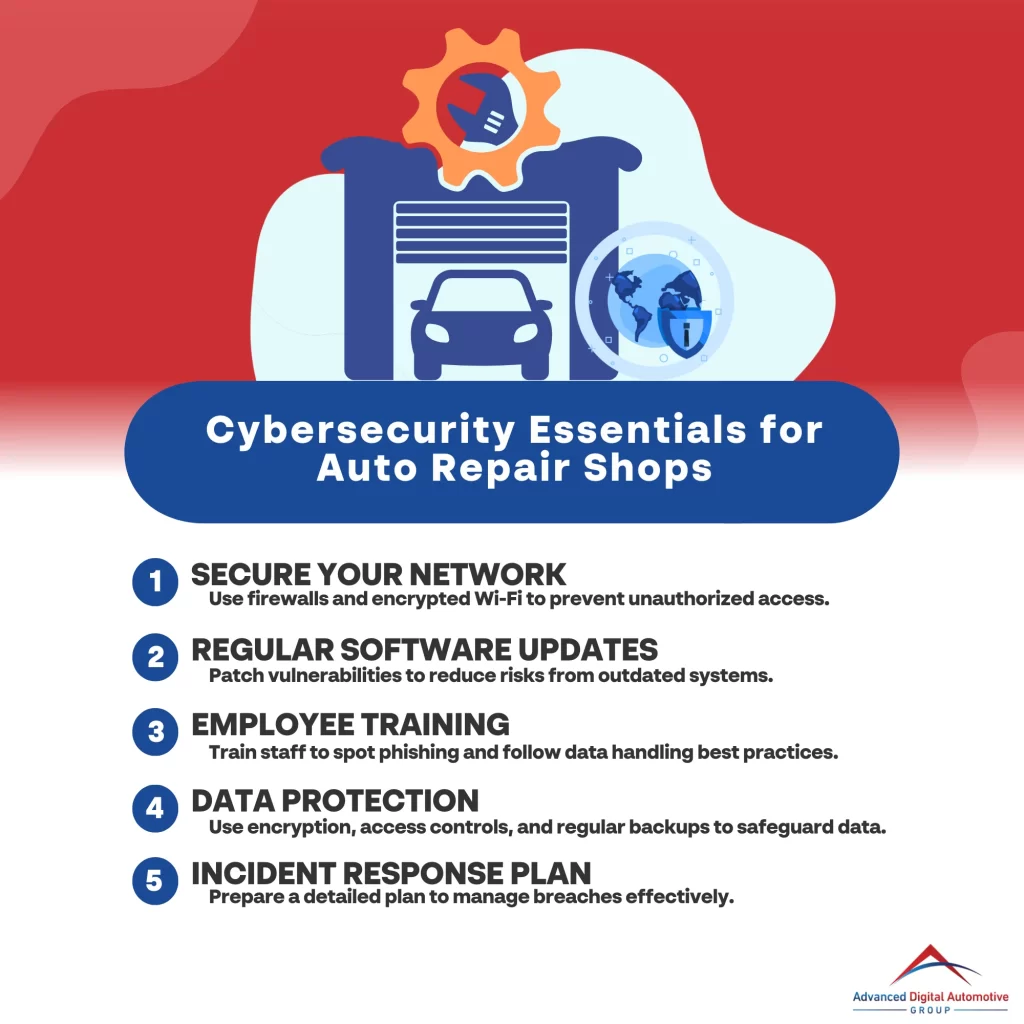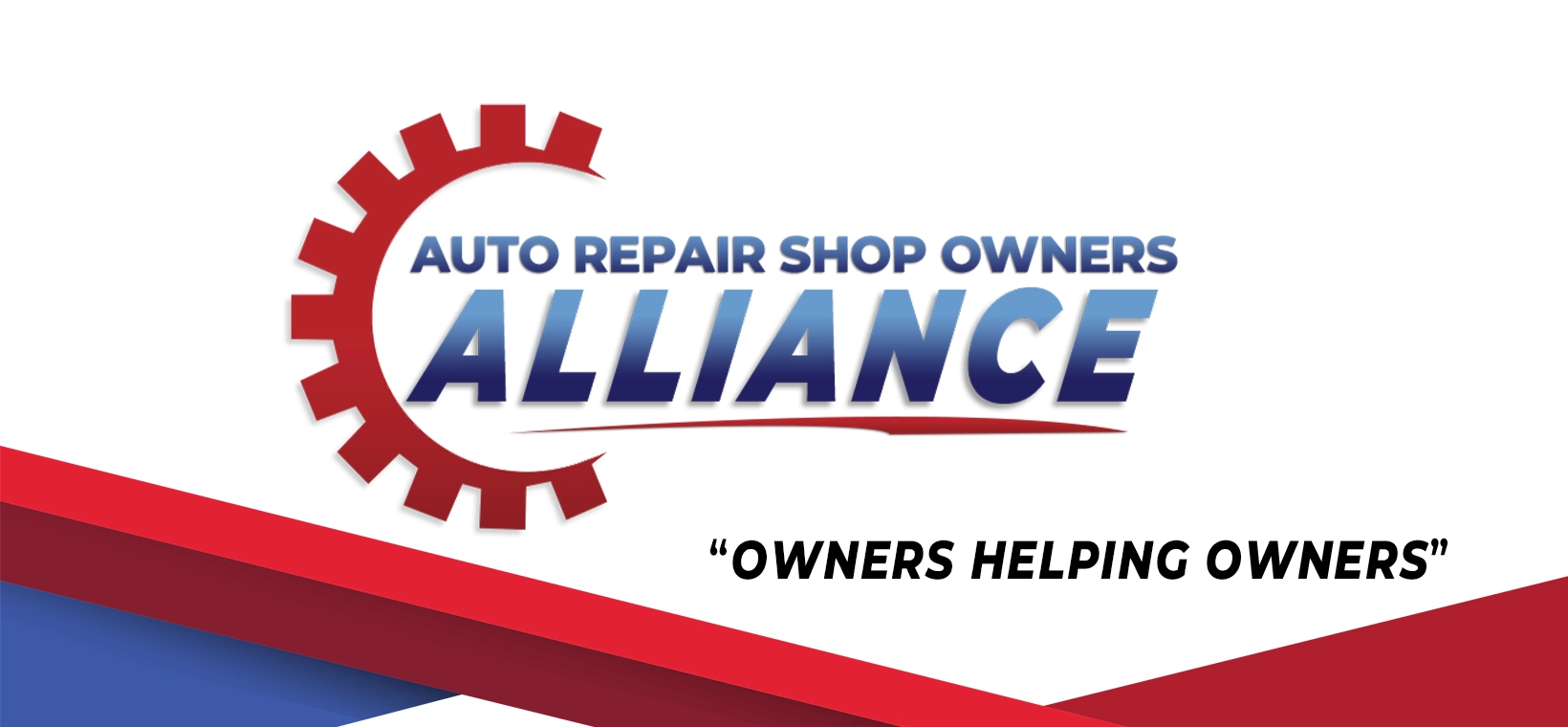To protect your auto repair shop from digital threats, you need a robust cybersecurity strategy. Start by implementing strong network security to guard against unauthorized access. Regularly update your software to patch vulnerabilities and safeguard customer data. Employee training is essential; educate your staff on recognizing phishing attempts and other threats. Establish data protection measures like regular backups and access controls. Finally, prepare an incident response plan to manage potential breaches effectively. By following these steps, you can enhance your shop’s security and minimize risks. There’s more to explore that can greatly bolster your defenses against cyber incidents.

Key Takeaways
- Implement strong network security measures, including firewalls, to protect sensitive data and control unauthorized access.
- Regularly train employees on identifying phishing attacks and other cyber threats to bolster overall cybersecurity awareness.
- Establish a comprehensive incident response plan, detailing roles, communication protocols, and regular drills to enhance readiness for cyber incidents.
- Conduct frequent software updates and maintain robust access controls to minimize vulnerabilities and ensure only authorized personnel can access sensitive information.
- Collaborate with cybersecurity experts for ongoing support, threat intelligence, and regular security audits to identify and mitigate potential risks.
Understanding the Risks
Understanding the risks your auto repair shop faces is essential for maintaining security. Data breaches can expose sensitive customer information, leading to significant financial and reputational damage. Additionally, operational disruptions can halt your services, impacting customer trust and your bottom line.
Data Breaches
In today’s digital landscape, small auto repair shops face considerable risks from data breaches that can compromise sensitive customer information and tarnish their reputation. These breaches can occur through various channels, including inadequate network security, phishing attacks, or unsecured software systems. As a shop owner, it’s vital to understand that the fallout from a data breach isn’t just financial; it can damage your credibility and customer trust.
Implementing robust cybersecurity for small businesses is essential. You should invest in automotive cybersecurity solutions that protect your systems from unauthorized access. Regularly updating software, utilizing firewalls, and conducting vulnerability assessments can greatly reduce your risk profile. Additionally, training your staff on cybersecurity best practices will empower them to recognize potential threats, ensuring a thorough defense against data breaches.
Moreover, having a response plan ready can mitigate the impact of a breach should one occur. This plan should include notifying affected customers promptly and outlining steps to rectify the situation. By prioritizing cybersecurity, you not only safeguard sensitive data but also enhance your shop’s reliability and trustworthiness in an increasingly digital marketplace.
Operational Disruption
Operational disruption poses a significant threat to small auto repair shops, impacting both daily operations and long-term viability. When you neglect cybersecurity, your business becomes vulnerable to various digital threats that can halt your operations and compromise customer trust. Here are three risks associated with operational disruption:
- System Downtime: Cyberattacks can lead to extended periods of downtime. This directly affects your ability to serve customers, ultimately resulting in lost revenue.
- Regulatory Compliance Issues: Non-compliance with automotive cybersecurity regulations can lead to hefty fines and legal repercussions. This instability can disrupt your operations and damage your reputation.
- Loss of Customer Data: A breach can expose sensitive customer information, undermining trust and loyalty. You’ll need effective cybersecurity services for small businesses to recover and reassure your clients.
Investing in robust cybersecurity measures is essential for mitigating these risks. By implementing proper protocols, you not only comply with automotive cybersecurity regulations but also safeguard your shop’s operations against potential disruptions. Protecting your business is not just about preventing attacks—it’s about ensuring your shop’s sustainability in a digitally evolving landscape.
Essential Cybersecurity Measures
To protect your auto repair shop from cyber threats, implementing essential cybersecurity measures is vital. You need to focus on network security, data protection, and employee training to create a robust defense against attacks. By prioritizing these areas, you can greatly reduce vulnerabilities and safeguard your business’s sensitive information.
Network Security
Establishing robust network security is essential for small auto repair shops aiming to safeguard sensitive customer data and proprietary business information. Effective auto cybersecurity measures can prevent unauthorized access and reduce the risk of data breaches. Implementing the following strategies will bolster your network security:
- Firewalls: Use advanced firewalls to monitor and control incoming and outgoing network traffic, ensuring that only authorized communications are allowed.
- Secure Wi-Fi Networks: Protect your Wi-Fi by using strong passwords and WPA3 encryption. This minimizes the risk of unauthorized access from customers or nearby businesses.
- Regular Software Updates: Keep all software, including operating systems and applications, updated. Regular updates help patch vulnerabilities that cybercriminals exploit.
Data Security
Data security is a critical aspect for small auto repair shops, as it protects sensitive customer information and business data from cyber threats. Implementing effective automotive cyber security solutions is vital to safeguard your operations against data breaches and unauthorized access. Small businesses need cyber security because they often hold valuable data, such as customer payment information and vehicle histories, making them attractive targets for cybercriminals.
To enhance data security, start by employing strong encryption methods for sensitive data both at rest and in transit. Regularly update your software to patch vulnerabilities that could be exploited by attackers. Additionally, consider using secure cloud storage options that comply with industry standards for data protection.
Establishing access controls guarantees that only authorized personnel can view or manipulate sensitive data, minimizing the risk of internal threats. Regularly back up your data to prevent loss in case of an attack. Moreover, invest in thorough cybersecurity training for your staff to recognize phishing attempts and other common threats. By prioritizing data security, you not only protect your customers but also fortify your business against potentially devastating cyber incidents.
Employee Training
Effective employee training is essential for bolstering cybersecurity in small auto repair shops. Your staff plays a vital role in protecting sensitive data and systems, especially in the domain of automotive cyber security. A well-informed team can greatly mitigate risks associated with digital threats.
To enhance your shop’s cyber security for cars, consider implementing the following training strategies:
- Regular Workshops: Conduct monthly workshops that cover the latest cybersecurity threats and best practices. This keeps employees informed about evolving risks.
- Phishing Simulations: Run simulated phishing attacks to educate employees on recognizing suspicious emails and links. This hands-on approach helps reinforce their knowledge.
- Data Handling Protocols: Train employees on secure methods for handling customer data and proprietary information. Emphasize the importance of password management and using encryption tools.
Neutralize the Threat
Cybersecurity threats pose notable challenges for small auto repair shops, making it vital to implement robust protective measures. To neutralize these threats effectively, you need to adopt a thorough automotive cyber security solution tailored to your specific operational needs. Begin by conducting a detailed risk assessment to identify vulnerabilities in your systems.
Next, invest in advanced firewall and antivirus software to create a strong barrier against potential intrusions. Regularly update your software to patch any security flaws that cybercriminals might exploit. Additionally, implement strong password policies and multi-factor authentication to safeguard sensitive customer and business data.
Training your employees on the importance of auto cyber security is imperative. Make certain they recognize phishing attempts and other common tactics used by attackers. Regularly back up your data to a secure location to mitigate data loss risks in case of a breach.
Finally, consider partnering with cybersecurity experts who specialize in the automotive sector. They can provide ongoing support and insights into emerging threats, making sure your defenses remain robust and effective. By taking these proactive steps, you can greatly reduce your shop’s vulnerability to cyber threats.
Frequently Asked Questions
How Can I Tell if My Shop Has Been Hacked?
You can tell if your shop’s been hacked by monitoring unusual account activity, unexpected software installations, slow system performance, unauthorized access attempts, or unfamiliar devices connected to your network. Regular audits help identify potential breaches promptly.
What Are Common Cyber Threats Facing Auto Repair Shops?
Common cyber threats facing auto repair shops include phishing attacks, ransomware, and data breaches. You should regularly update software, train employees on security practices, and implement firewalls to mitigate these risks effectively and protect your business.
Can Cybersecurity Insurance Benefit My Auto Repair Business?
You might not realize it, but cybersecurity insurance can be your safety net. It covers financial losses from breaches, legal fees, and recovery costs, ensuring your business remains stable and secure amidst unpredictable digital threats.
How Often Should I Update My Cybersecurity Protocols?
You should update your cybersecurity protocols regularly—at least every six months or after any significant system changes. This guarantees defenses remain effective against evolving threats, minimizing vulnerabilities, and maintaining the integrity of your business’s digital assets.
Are There Free Resources for Improving My Shop’s Cybersecurity?
You can utilize resources like the Cybersecurity & Infrastructure Security Agency’s free toolkit. For example, a shop improved its defenses by following their guidelines, markedly reducing vulnerabilities without incurring additional costs. Start protecting your business today.
Conclusion
In the digital landscape, your auto repair shop is like a sturdy vehicle steering through an unstable and stormy road. Without the right cybersecurity measures, you risk skidding off track, facing data breaches and operational disruptions. By fortifying your defenses—much like checking your tires and brakes—you guarantee a smoother journey ahead. Remember, investing in cybersecurity isn’t just about avoiding pitfalls; it’s about guiding your business toward trust and reliability. Keep your wheels aligned, and your shop will thrive amidst the digital turbulence.









